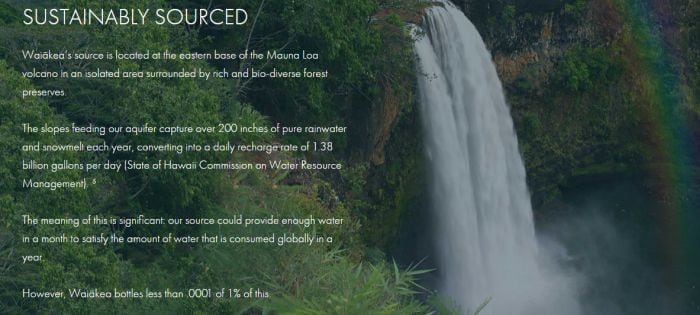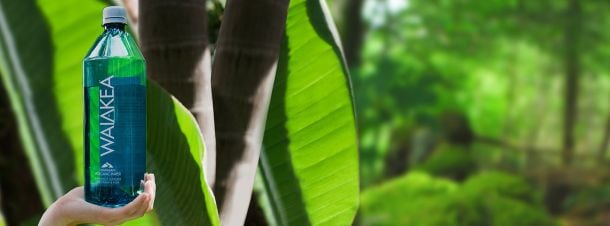Speaking to FoodNavigator-USA following the publication of an article in the Hawaii Tribune-Herald ['Tapped out: County water is source of premium brand'] that Emmons claimed was motivated by a competitor, he said: “We have never been labelled as, or claimed to be, a spring water."
Asked whether the brand's domain name WaiakeaSprings.com might have confused consumers, he said:"We own multiple domains, including Waiakea.com. Please note that Hawaiian Springs is also not a spring water, yet has that URL.”
‘An incredible mineral profile’
So where is Waiākea's water actually coming from?
On its website, next to a picture of a waterfall, the company states that “Waiākea’s source is located at the eastern base of the Mauna Loa volcano in an isolated area surrounded by rich and bio-diverse forest preserves,” and that “The slopes feeding our aquifer capture over 200 inches of pure rainwater and snowmelt each year, converting into a daily recharge rate of 1.38 billion gallons per day.”
Asked to clarify the source, Emmons told us that Waiākea's water is sourced from the Pahoa aquifer in Hawaii's Big Island, adding: “Municipal water for local residents comes from this and multiple aquifer systems in the area.
“[The water source] is owned and managed by the state but the well itself and water is of the highest quality and goes through that same journey of volcanic rock to give it its incredible mineral profile.
“Waiakea has a 99 year exclusive water permit issued by Hawai’i that gives us access to our own well pipe, which is not available to the public without permit…
“We were able to obtain ours when we heard through the coconut wireless from my cousin that one was becoming available for the first time in years. Anyone could have purchased such a permit but they are limited in supply and still somewhat difficult to obtain. Only one other company taps into the same aquifer, but at a different elevation and thus has a different mineral composition.”
In 1995, FDA established standard of identity regulations for bottled water:
- Names that may be used to identify bottled water products include 'bottled water,' 'drinking water,' 'purified water,' 'spring water' etc
- Bottled water from a community water system must, unless expressly exempt, bear a label that states 'from a community water system' or 'from a municipal source,' as appropriate.
Source: International Bottled Water Association
‘We have labelled it as a ‘from a community water source’ since March 2016’
He explained: “What has changed was our discovery that the well taps the border of the Kea’au and Pahoa aquifers but on the Pahoa side, and thus we immediately changed the name of the aquifer [previously Waiākea had described its water as originating 'from an artesian well after being filtered through thousands of feet of volcanic rock through the Mauna Loa aquifer system that feeds into the Kea’au Aquifer'].
“This aquifer [the Pahoa aquifer] is also highly sustainable and provides the same quality of water as the Kea’au…”
Asked about recent label changes, and why the company has not explicitly made clear that it is sourcing its water from county/municipal water sources, he added: “We have labelled it as a ‘from a community water source’ since March 2016 [following talks with the California Department of Health], however this does not take away from the quality and attributes of the water, as our competitor has tried to position things.
"We were originally told the wells met the FDA definition for 'artesian.'
"Again the unfortunate part is the competitor has tried to position that the quality of the water is questionable- it is not. The source has an incredible sustainable yield and recharge rate.
‘We have never made any health claims that the water is magic’

As for its properties (the water has a higher pH than most municipal tap water), he said: “We have never made any health claims that the water is ‘magic.’ The water itself is high quality with a low TDS (total dissolved solids) range and a naturally alkaline pH.”
Waiākea's water - which is filtered through thousands of feet of porous volcanic rock infusing it with sodium, calcium, potassium, silica and magnesium - is unusual in that it is naturally alkaline (around pH 8.8), who noted that this is a point of difference for many bottled water consumers on the mainland.
Asked about the bottling operation [Waiākea currently ships the water in bulk to the US and bottles it in California], he said a new facility would be coming onstream in Hilo in the coming months: “Waiākea did not originally have access to the necessary capital to build a facility at the source in Hawai’i. So we looked at alternative, cost-effective solutions that would also minimize our carbon footprint. “
"We were originally told the wells met the FDA definition for 'artesian.'"
‘We remove the chlorine through charcoal filters and the proper ultraviolet filtration’
He added: “The solution we found was to ship the water in clean, high-grade, circulating stainless steel tanks to a trusted co-packer in California.”
Asked if Waiākea's water is chlorinated, he said: “California requires all water coming into the state to be chlorinated.

“However, we immediately remove the chlorine through charcoal filters and the proper ultraviolet filtration, which is also mandatory by California and most states. This process does not affect the mineralization, pH levels, or taste. This model enabled us to validate our initial concept as the first triple-bottom-line premium water with the hope that we would eventually build a facility at the source in Hawai’i.
“We are thrilled to finally make this a reality, as we will soon be launching our Hilo plant after a year of planning including the eventual use of our Hawaiian family’s spring source. We have only received positive and excited responses about this launch from locals, as it will create much needed jobs for Hilo where there is a high level of unemployment yet a large pool of skilled workers.”
I grew up with Hawai’i as my second home and spend half my time there now
He added: “The locals are also thrilled that almost 4% of our revenue is allocated to the Kama’aha Education Initiative, a Hilo non-profit, as well as the Hawai’i Conservation Alliance. This is significantly more than any other bottled water or beverage company in the islands has ever committed towards local social initiatives. The other 3% of Waiakea's revenue goes to our clean water and sanitation projects in Africa."
Finally, he said, “I would like to address the allegations that we’re ‘non-local.’ I grew up with Hawai’i as my second home and spend half my time there now, with an office in Hilo and a mainland headquarters in LA.

“I deeply love the islands, and my Ohana has been on the Big Island and Oahu for generations and is from a respected Halau,” added Emmons who first launched Waiākea in 2012 with co-founder Matt Meyer and now sells it in thousands of stores across the US.
Attorney: A company is vulnerable to a false advertising lawsuit if, given the overall impression of its advertising, consumers are confused about the source of the water
Asked for a legal perspective the use of the 'waiakeasprings' URL, one food law attorney told FoodNavigator-USA:
"Because Waiakea sells its products online, its [waiakeasprings.com] website would be considered 'labeling' subject to the FDA’s jurisdiction, and the FDA would most likely take issue with use of the word 'springs' in the website name, if the product did not meet the definition for spring water.
"Regardless, a company is vulnerable to a false advertising lawsuit if, given the overall impression of its advertising, consumers are confused about the source of the water. Accurate descriptions somewhere on the label or the website could offset some of this risk. But, from a cursory review of the website, I could not find a reference to 'community water source'."
